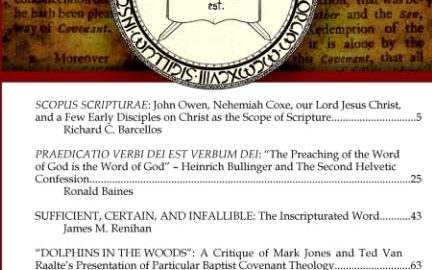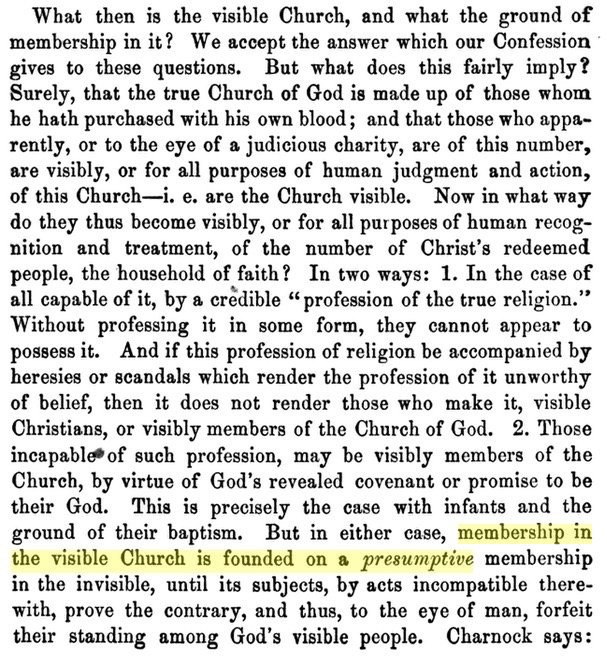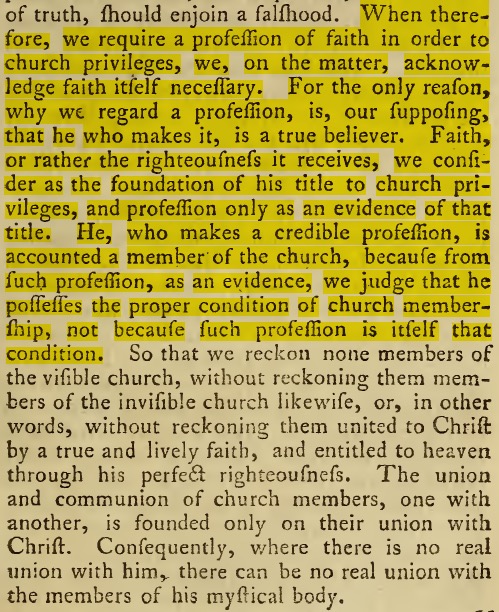Samuel Renihan
“DOLPHINS IN THE WOODS” A Critique of Mark Jones and Ted Van Raalte’s Presentation of Particular Baptist Covenant Theology (JIRBS 2015)
On 08, May 2024 | In Samuel Renihan | By Brandon Adams
Samuel Renihan’s JIRBS 2015 essay “DOLPHINS IN THE WOODS” A Critique of Mark Jones and Ted Van Raalte’s Presentation of Particular Baptist Covenant Theology is now available to read in PDF, or below.
No one ever loses a debate. Both sides walk away in victory because they stated their cases correctly. The opponent, of course, completely misunderstood and simply didn’t get it. Even the audience agrees. “Our side won.” Sadly, most debates are like this, and debates between paedobaptists and Baptists throughout the years have been no exception to the trend. For many centuries the baptismal debate has divided, disappointingly but necessarily, brothers who otherwise share a great deal in common.
In Joel Beeke and Mark Jones’ massive and delightful A Puritan Theology they have dedicated a chapter to describing this debate as it took place in the late seventeenth century.[1] Their chapter sets out to do two main things: first, to vindicate John Owen’s covenant theology from Baptist appropriation, and second, to demonstrate how John Flavel bested Philip Cary in their printed debate on the subject of covenant theology. This present article will evaluate the portrayal of the Particular Baptists as it is found in that chapter, clarifying how and why the Particular Baptists appropriated John Owen’s covenant theology and demonstrating that while the Cary/Flavel debate is useful for illustration, Cary’s views must be placed within the context of Particular Baptist federalism as a whole—particularly regarding the conditionality of the covenant of grace and the purpose and design of the Mosaic covenant. This evaluation is not intended to revive the debate itself, but rather to present a fairer and more complete portrait of Particular Baptist federalism and their arguments against paedobaptism.
* Samuel Renihan, M.Div., is a pastor at Trinity Reformed Baptist Church in La Mirada, CA and a Ph.D. student at the Free University of Amsterdam.
[1] The acknowledgments in the introduction state that Ted Van Raalte co-wrote this chapter with Mark Jones. Joel R. Beeke and Mark Jones, A Puritan Theology: Doctrine for Life (Grand Rapids, MI: Reformation Heritage Books, 2012), xiv. The chapter referenced is chapter 45 on pages 725-41. Read more…Semper Reformanda 2023: Covenant and Kingdom
On 24, Oct 2023 | In Audio, James Renihan, Pascal Denault, Resources, Samuel Renihan, Video | By Brandon Adams
Grace Family Baptist Church in Houston, TX recently held their annual Semper Reformanda conference. This year was on Covenant and Kingdom: A Study in Reformed Baptist Covenant Theology featuring James Renihan, Sam Renihan, and Pascal Denault.
The recordings are now available online (both audio and video):
https://web.sermonaudio.com/broadcasters/gracefamilybaptist/series/183063

1) The Great DivideDr. James M. Renihan 100+ Conference


2) The Mystery of ChristDr. Samuel Renihan 100+ Conference


3) Distinctives Between Particular Baptist and Paedobaptist FederalismPascal Denault 100+ Conference


4) Baptist Covenant Theology vs. DispensationalismPascal Denault 100+ Conference


5) Kingdom of Creation: Covenant of Works and Noahic CovenantDr. Samuel Renihan Conference


7) Kingdom of Israel: Abrahamic, Mosaic, and Davidic CovenantsDr. Samuel Renihan Conference


8) Kingdom of Christ: Covenants of Redemption and Grace, and Eschatalogical Nature Dr. Samuel Renihan Conference

Mystery of Christ on Audible
On 21, Jun 2022 | In Audio, Books, Samuel Renihan | By Brandon Adams
Sam Renihan’s The Mystery of Christ, His Covenant, and His Kingdom is now available on Audible!
Two-Tier Typology & OT Salvation (Response to Christ the Center)
On 15, Jun 2022 | In Audio, Richard Barcellos, Samuel Renihan, Video | By Brandon Adams
Reformed Forum recently engaged with 1689 Federalism in CTC #736 John Owen, Jeremiah 31, and the Relationship between the Old and New Covenants. We are thankful for their interest in the topic and for the precision they bring to the discussion. Dr. Sam Renihan and Dr. Richard Barcellos joined Brandon Adams to respond to the episode. Our discussion is available on YouTube and as an mp3 file – both in the full (2 hour) and abridged (1 hour) versions. Some supplemental material and links to resources are at the end of this post.
MP3
- MP3: Two-Tier Typology & OT Salvation [1689 Federalism]
- MP3: Two-Tier Typology & OT Salvation (Abridged) [1689 Federalism]
- Podcast RSS Feed (The host may not like this, so let me know if it stops working. See here for instructions to manually add this feed to your podcast player. You need to copy the URL and add it.)
Chapters
- 0:00:00 Introduction
- 0:06:24 Overview of 1689F view of Old Covenant
- 0:07:24 Perfect Obedience vs Outward Obedience
- 0:14:14 Subservient Covenant
- 0:17:22 Objection to Outward Obedience
- 0:26:47 Exile
- 0:32:01 God’s Longsuffering Towards Israel
- 0:33:31 First-tier Function of the Sacrificial System
- 0:44:27 Are All Types Symbols?
- 0:48:16 Salvation of NT Saints
- 0:53:18 Salvation of OT Saints
- 0:58:01 Salvation by the Word in the OT
- 1:04:22 Relationships of Types to the Promise
- 1:07:48 Prophets Looking for Christ; Did all elect fully understand?
- 1:14:36 WCF/2LBCF 8.6
- 1:25:06 Substance of a Covenant: Old v New
- 1:28:39 Did the Old Covenant Promise Regeneration?
- 1:30:09 Were OT Types Bare Forms? First-Tier Function
- 1:31:27 Jer 31: Historia or Ordo?
- 1:34:18 Retroactive New Covenant
- 1:39:05 Historical Theology: Subservient Covenant Quotes
- 1:48:42 Affirm or Deny: Did Sacrifices Remit Outward Sins?
- 1:50:01 Philip Cary
- 1:50:46 Subservient Cov view is Key to Resolving the Debate
- 1:52:54 Vos’ Triangle
Show Notes
- Thomas Goodwin on Old Covenant condition as outward obedience, contra the condition of the Covenant of Works as perfect, perpetual, entire obedience (contrary to the OPC Report on Republication’s claim that the subservient covenant view saw the condition of the Old Covenant as the same as that of the Covenant of Works)
- From Shadow to Substance: The Federal Theology of the English Particular Baptists (1642-1704) Sam Renihan’s dissertation on the subservient covenant tradition, particularly the Particular Baptist branch
- The Mystery of Christ, His Covenant, and His Kingdom Sam Renihan
- The Family Tree of Reformed Biblical Theology: Vos and Owen Richard Barcellos’ dissertation
- 1689Federalism.com
John Cameron
The Sacrifices, Sacraments, and Ceremonies of the Ancients had their carnal use, over and besides the spiritual signification… So Circumcision, primarily, did separate between the seed of Abraham and the rest of the Nations; it did seal unto them the earthly promise: secondarily, it did signify out sanctification. In like manner the Passover, primarily, the passing over of the destroying Angel; secondarily, Christ: so also the sacrifices, and the cleansings, they represented, primarily, a certain carnal holiness: secondarily, they figured out Christ, and the benefits of the New Covenant.[1]Cameron, Three-fold Covenant of God, 399-400.
Thomas Goodwin
There Goodwin asserts that the Mosaic covenant “was Fœdus Subserviens to the Gospel, (as Learned Cameron calls it)” and “was truly the promulgation of the covenant of nature made with Adam.”
Goodwin, Works, V:330.
Following Cameron’s two-tiered typology, Goodwin called the Mosaic covenant an “outward covenant with the Jews” whose ordinances “besides their spiritual use in typifying things Heavenly to Spiritual Believers then, they had an outward carnal use to the whole Nation.” The forgiveness provided by the sacrificial system was “a Forgiveness of reprieval, not to be destroyed for their sin…and so had a Sanctification and a Justification which were not really such, that is, not of the heart and conscience.”
Goodwin, Works, V:331-332. Emphasis original.
John Brinsley
Quest. But how are those sacrifices said to make an Atonement for the people, or to Expiate them? for so the Hebrew word is there most properly rendered, importing a freeing and delivering one from the Guilt and punishment of sin. Now how are those sacrifices said to have done this?
A. For answer to this, we must take notice that in those sins committed under the Law there was a twofold guilt; A Ceremonial and a Moral guilt; or an External and an Eternal guilt. An External or Temporal guilt, a guilt before men, binding the offenders over unto temporal punishment. An Eternal or Spiritual guilt before God, binding them over unto Eternal condemnation. Now as for the former of these, that External or Ceremonial guilt, that was expiated and taken away by performing that which was legally required in the way of a Ceremonial satisfaction. Hereby the people offending was acquitted before men, in foro Externo, and freed from Temporal guilt and punishment, by virtue of that Sacrifice, or rather God’s Ordinance and Institution concerning it. But for the latter, that Eternal and Moral guilt, that was expiated and taken away by those Sacrifices only Typically and Sacramentally: viz. as they represented and shadowed out the true Expiatory Sacrifice of Jesus Christ. And thus are those Sacrifices said to have Expiated the people. It is a Sacramental phrase and manner of speech, wherein that which is the proper effect of the thing signified, is attributed to the sign. Even as the Sacramental water in Baptism is said to wash away sins, Act. 22.16. Thus did the blood of these Sacrifices expiate the sins of the people, by representing the Expiation of Christ, that Satisfaction whereby his people are freed from eternal guilt.
John Brinsley, MESITHS, Or, The One and Onely Mediatour Betwixt God and Men, the Man Christ Jesus (London: Thomas Maxey, 1651), 101-102.
As for those Sacrifices, they extended only to a Ceremonial and Temporal Expiation; and that only of some sins. But the Sacrifice of Christ extends to a real, Eternal Expiation; and that of all sins. So Paul delivers it in his Sermon at Antioch, Act. 13.39. By him all that believe are justified from all things, from which ye could not be justified by the Law of Moses. By the Law of Moses, by those Legal Sacrifices therein prescribed, none could be justified before God for any sins. So much we may learn from this our Apostle, Heb. 10.1. The law can never by those sacrifices, which they offered year by year, make the comers thereunto perfect. That is, as touching the Conscience, as the same pen expounds it, chap. 9.9. They could not in and by themselves, as separated from their spiritual significations, sanctify or purify the Conscience; they being Corporal, and that Spiritual. Neither could they give an absolution in foro conscientiae, they could not give any assurance to the Conscience that sin was pardoned, and reconciliation obtained with God. In reference hereunto the Apostle tells us ver. 4. of that 10th chapter, that It is not possible that the blood of Bulls and of Goats should take away sin: Take away the Eternal guilt of it. And as for the External and Temporal, it extended (as I said) only to some kinds of sin.
Brinsley, MESITHS, 102-103.
John Owen
All the Levitical Services and Ordinances were in themselves carnal, and had carnal ends assigned unto them, and had only an obscure representation of things spiritual and eternal.
Owen, A Continuation of the Exposition, 375.
There were some lines and shadows, to represent the body, but the body itself was not there. There was something above them and beyond them, which they reached not unto.
Owen, A Continuation of the Exposition, 204.
Philip Cary
We do indeed acknowledge the subserviency of the law to Christ, and the covenant of grace…But it does not therefore follow, that the law is a covenant of gospel-grace…The law is not the gospel, nor the gospel the law. And therefore though the one of them is plainly subservient to the other, yet they ought not to be mixed, blended, or confounded the one with the other, as if they were but one and the same covenant, and no difference to be made between them; only in respect of the different degrees of the discovery of gospel grace, as has been suggested… A subserviency in any thing to promote the ends of something else, does not make it to be the thing itself; the ends whereof are promoted thereby.
Philip Cary, A Solemn Call Unto all that would be owned as Christ’s Faithful Witnesses, speedily, and seriously, to attend unto the Primitive Purity of the Gospel Doctrine and Worship: Or, a Discourse concerning Baptism (London: John Harris, 1690), 167.
SCRBPC 2021 “Of God’s Covenant”
On 07, Nov 2021 | In Audio, Resources, Richard Barcellos, Samuel Renihan | By Brandon Adams
The 2021 Southern California Reformed Baptist Pastors’ Conference concluded last week. Each year the conference focuses on a chapter of the 2nd London Baptist Confession of Faith. This year focused on Chapter 7 “Of God’s Covenant.” Samuel Renihan gave 6 lectures and Richard Barcellos gave one. The audio is now available on Sermon Audio. PDF handouts of the sessions are available on Sermon Audio as well. (There was a problem with the first session’s audio recording and it is not available).
Lectures: Sam Renihan @ Doctrine & Devotion 2020 Conference
On 23, Oct 2020 | In Audio, Resources, Samuel Renihan | By Brandon Adams
Sam Renihan taught on 1689 Federalism at the 2020 Doctrine & Devotion Conference: Covenant Theology: God’s Promises for God’s People. He had 4 lectures
- Abrahamic Covenant
- Mosaic Covenant
- Davidic Covenant
- New Covenant
Podcast: Sam Renihan @ Distilling Theology
On 23, Oct 2020 | In Audio, Resources, Samuel Renihan | By Brandon Adams
Episode 39: Concerning Hobbits // A Discussion on 1689 Baptist Covenant Theology w/ Samuel Renihan
We’re thrilled to be joined this week by Dr. Samuel Renihan, author of “God without Passions,” “The Mystery of Christ, His Covenant, and His Kingdom,” and “From Shadow to Substance: The Federal Theology of the English Particular Baptists.”
Eric is back with us and he tries to become best friends with Sam, Justin revels in roasting Blake for his minority Covenant Theology position (this week), and there’s enough dad jokes to last the trip to Mordor and back. The guys sip Johnnie Walker Double Black Label, a blended scotch whisky favored by our esteemed guest, and deep dive into some of the distinctives of Baptist Covenant Theology.
We’re giving away a copy of Dr. Samuel Renihan’s book “The Mystery of Christ” and a DT Glencairn – Enter to win by visiting www.DistillingTheology.com/Giveaway between now and Friday, 9/25.
The entire 2.5 hour EXTENDED EDITION of this episode is available in full exclusively at patreon.com/distillingtheology. Check out more extended episodes, watch us live stream our episodes before they are released, and get access to exclusive bonus content on Patreon, starting at just $4.99 per month: https://patreon.com/distillingtheology
We’ve introduced a new $14.99 per month level with some extra perks, including a Patreon-exclusive coffee mug after your first 3 months as a thank you for your support.
Podcast: Sam Renihan @ The New Geneva Podcast
On 23, Oct 2020 | In Audio, Resources, Samuel Renihan | By Brandon Adams
- Comparing 1689 Baptist and Presbyterian & Reformed Covenant Theology…and how it relates to Baptism with Michael G. Brown & Samuel Renihan (Part 1)
- Comparing 1689 Baptist and Presbyterian & Reformed Covenant Theology…and how it relates to Baptism with Michael G. Brown & Samuel Renihan (Part 2)
Podcast: Sam Renihan @ Theology Driven
On 23, Oct 2020 | In Audio, Resources, Samuel Renihan | By Brandon Adams
Listen in as Sam Renihan explains the importance of Baptist Covenant Theology!
Podcast: Sam Renihan @ The Sword & the Trowel
On 23, Oct 2020 | In Audio, Resources, Samuel Renihan | By Brandon Adams
TS&TT: Sam Renihan | Mystery of Christ & Covenant Theology
Today on The Sword & The Trowel, Tom Ascol and Jared Longshore welcome Dr. Samuel Renihan on the show to discuss the release of the newest Founders Press title The Mystery of Christ, His Covenant and His Kingdom. They talk about how the book came to be, why it was written and why it is an important resource for Christians today.





